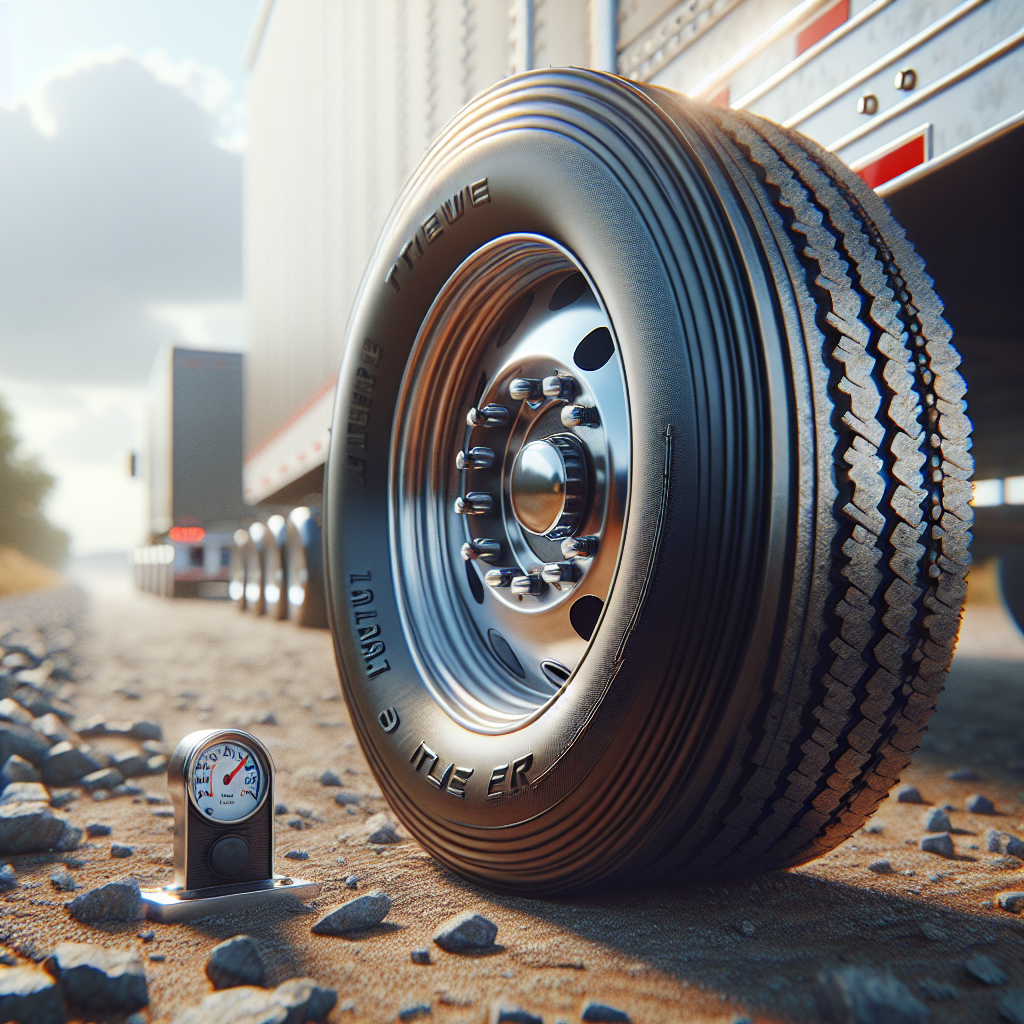Maintaining optimal tire temperature is crucial for the performance and safety of your trailer. Understanding the importance of trailer tire temperature can not only improve your driving experience but also extend the lifespan of your tires. When the temperature of your trailer tires rises significantly, it can lead to a series of issues that compromise your safety on the road.
High tire temperatures can be attributed to several factors, including:
- Under-inflation: When tires are under-inflated, they create excessive friction, leading to increased heat.
- Overloading: Exceeding the recommended weight limit puts undue stress on tires, causing them to heat up quickly.
- Brake Drag: If the brakes are not releasing properly, they can cause tires to overheat.
- Poor Alignment: Misalignment can lead to uneven wear and increased rolling resistance, generating heat.
By monitoring tire temperatures, you can detect these issues early and take corrective actions to prevent catastrophic failure events. Technologies like TrailerWatchdog allow you to track tire temperatures in real-time, ensuring you are always aware of your trailer's condition while on the road.
Understanding and managing your trailer tire temperature is essential for safe towing. Tow with peace of mind, knowing that TrailerWatchdog is standing guard.
Common Causes for Trailer Tire Overheating

Trailer tire overheating is a concern that every trailer owner should take seriously. Identifying the common causes for trailer tire overheating can help prevent accidents and costly repairs. Below are some primary reasons why your trailer tires may become excessively hot:
- Insufficient Tire Pressure: One of the leading causes of overheating is low tire pressure. Under-inflated tires generate more heat due to increased rolling resistance.
- Excessive Load: Overloading your trailer beyond its capacity can lead to tire strain, causing them to heat up rapidly.
- Poor Tire Quality: Using low-quality tires can result in inadequate heat dissipation, increasing the likelihood of overheating.
- Brake Issues: If the brakes are sticking or not releasing properly, they can create friction, causing the tires to overheat.
- Alignment Problems: Misaligned wheels can cause uneven tire wear and increased friction, leading to elevated temperatures.
- Driving Habits: Aggressive driving, including sudden acceleration and hard braking, can put extra stress on your tires, contributing to overheating.
By being aware of these factors, you can take proactive steps to ensure that your trailer tires remain cool and safe during your travels. Regular maintenance checks and tire monitoring systems can provide invaluable insights into your trailer's performance, keeping you informed and preventing potential issues.
Signs Indicating Your Trailer Tires Are Too Hot

Recognizing the signs indicating your trailer tires are too hot is crucial for ensuring safety on the road. Overheating tires can lead to blowouts, loss of control, and potentially dangerous situations. Here are some key indicators to watch for:
- Unusual Smells: A burning rubber smell is often a strong indicator that your tires are overheating. This scent arises from the tire material breaking down under excessive heat.
- Visual Inspection: Look for visible signs of damage such as bulges, cracks, or blistering on the tire surface. These can indicate that the tire is reaching unsafe temperature levels.
- Frequent Flat Spots: If you notice that your tires are developing flat spots or uneven wear patterns, it may suggest overheating due to improper alignment or excessive load.
- Tire Pressure Warning: If your tire pressure monitoring system alerts you to high temperatures or pressures, it’s essential to pull over and assess the situation.
- Excessive Vibration: If you experience unusual vibrations while towing, it may indicate that your tires are overheating and not functioning properly.
Monitoring these signs while on the road can help you address tire issues before they escalate into serious problems. Regular checks and maintenance can help ensure that your trailer tires remain in optimal condition, contributing to a safer towing experience.
Effective Solutions to Cool Down Hot Trailer Tires

When faced with the issue of hot trailer tires, it's essential to implement effective solutions to cool them down. Taking immediate action not only helps in prolonging the life of your tires but also ensures safer towing. Here are several strategies to effectively manage and cool down hot trailer tires:
- Stop and Inspect: The first step is to safely pull over and inspect the tires. Allow them to cool naturally for a few minutes before touching or checking the pressure.
- Check Tire Pressure: Use a tire pressure gauge to verify the pressure in each tire. High temperatures can cause tire pressure to rise significantly, so ensure that they are within the manufacturer’s recommended range.
- Adjust Load Distribution: Improperly distributed weight can lead to overheating. Ensure that your load is evenly distributed across the trailer to minimize stress on any individual tire.
- Reduce Speed: Slower speeds can help decrease the friction generated by the tires on the road, which in turn reduces temperature buildup. Adjust your driving habits to allow for a cooler ride.
- Upgrade to Higher Quality Tires: Consider investing in high-performance tires designed for better heat resistance. These tires can often withstand higher temperatures and provide better overall performance.
Implementing these solutions not only helps in cooling down overheated tires but also enhances your overall towing experience. Regular maintenance and awareness of your trailer’s condition are vital in preventing tire issues before they become serious.
Preventive Measures for Trailer Tire Overheating

To ensure a safe and efficient towing experience, adopting preventive measures for trailer tire overheating is crucial. By taking proactive steps, you can significantly reduce the likelihood of tire failure due to heat. Here are some effective strategies to keep your trailer tires cool:
- Regular Inspections: Conduct routine inspections of your tires to check for signs of wear, cracks, or damage. Identifying issues early can prevent overheating problems down the line.
- Maintain Proper Tire Pressure: Keep your tires inflated to the manufacturer's specified pressure. Under-inflated tires generate more heat due to increased friction, while over-inflated tires can lead to blowouts.
- Monitor Load Capacity: Always adhere to your trailer's load capacity. Overloading can cause tires to work harder than necessary, leading to excessive heat buildup.
- Utilize Tire Monitoring Systems: Implement a tire monitoring system, like TrailerWatchdog, that provides real-time data on tire temperature and pressure. This technology helps you stay informed and take action before problems escalate.
- Rotate Tires Regularly: Just like vehicle tires, regularly rotating your trailer tires ensures even wear and can help in preventing heat-related issues.
By integrating these preventive measures into your trailer maintenance routine, you can enhance safety, improve performance, and extend the lifespan of your tires. A little diligence goes a long way in avoiding the costly consequences of overheating.
When to Consult a Professional for Tire Issues
While many tire issues can be managed with routine maintenance and preventive measures, there are times when it’s essential to consult a professional. Recognizing when to seek expert help can prevent minor problems from escalating into major safety hazards. Here are some indicators that warrant a trip to a tire specialist:
- Severe Wear Patterns: If you notice uneven tire wear, it could indicate alignment or suspension issues. A professional can diagnose the problem and recommend necessary repairs.
- Frequent Overheating: If your trailer tires are consistently running hot despite regular checks and proper inflation, it’s time to get a professional assessment to identify underlying issues.
- Visible Damage: Any signs of cuts, bulges, or punctures in the tire should be evaluated by a tire expert. Attempting to continue using damaged tires can lead to catastrophic failure on the road.
- Unusual Noises: If you hear strange sounds while towing, it may signal a problem with your tires or other components. Consult a professional to ensure everything is functioning correctly.
- Frequent Blowouts: Multiple blowouts within a short period indicate a serious issue. A professional can help determine the cause and recommend solutions.
When in doubt, it’s always wise to err on the side of caution. Consulting a tire professional not only enhances your safety but also prolongs the life of your trailer. Tow with peace of mind, knowing that TrailerWatchdog is standing guard.








